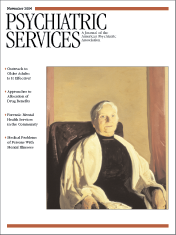To the Editor: We report a case of anticholinergic delirium that illustrates the importance of assessing patients' cultural and religious beliefs.
An Asian-American octogenarian woman had been taking 4 mg of tolterodine (Detrol LA) every evening for incontinence, a dosage that she had been maintained on for approximately two and a half years. She was admitted to a major military tertiary care center because she had had three or four episodes of loose, bloody stools over a period of approximately a week. Psychiatry was consulted because the patient said she had been troubled by images at night, between 8:30 and 9:00 p.m., while she was in bed. She described these "visions" as those of "spirits" enveloped in clouds. Faces with varying forms seemed to emerge from the shadows of her bedroom and float over the top of her bed. One face in particular was very clear. It was the face of a young man with blonde hair whom the patient did not recognize as anyone she had ever met before. Occasionally when she would ask these images what they were doing in her bedroom, they would "leave." When this did not suffice she would confront them, and they would retire to the shadows once again.
The woman and her husband had tried various things to make these visions stop, such as praying and asking other people to pray for them. Ultimately, because the couple was Catholic, they had a priest come to the house to perform an exorcism. The psychiatric consultation team reviewed the patient's medications and recommended discontinuation of tolterodine. The couple was willing to try this after the team had explained that perhaps these images were related to a side effect of the medication. The medication was stopped, and within two days the hallucinations ceased. The patient was discharged from the hospital three days after the recommendation without any complaint. She and her husband were able to return to a more restorative sleep pattern.
Although delirium and the phenomenon of "sundowning" is a very well-described pattern among elderly persons, little has been written about the effects of tolterodine. One large prospective observational cohort study concluded that the age- and sex-adjusted relative risk of hallucinations with tolterodine compared with that of the anticholinergic drug terodiline, and with ten drugs of other therapeutic classes, was 1.25 and 4.85, respectively (
1).
For the consultant psychiatrist, this case report demonstrates the importance of a thorough chart review to uncover a problem that is very common and easily solved, yet one from which this patient had been suffering needlessly for years. Assessment of religious and cultural beliefs also uncovered how this couple was able to accept this suffering, and assessing these beliefs may be significant for them in the future, especially when addressing living wills, hospice care, or other end-of-life issues. Clinicians therefore should be cautious when prescribing anticholinergic medications for elderly patients and should also attempt to understand more about their patients' beliefs and lives.

